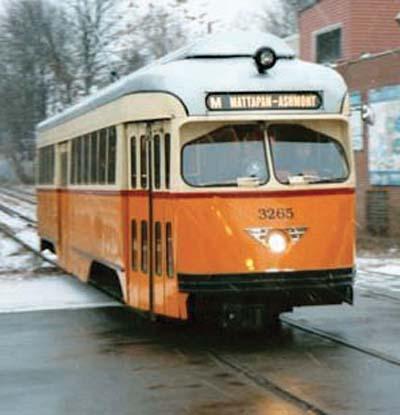January 5, 2012

Mattapan high speed trolley: MBTA proposal would cut weekend service entirely.
Transportation officials are weighing the shutdown of the Mattapan trolley line on weekends as part of a pair of proposals to cut costs and raise money for the cash-strapped MBTA. The proposals under consideration also hike fares, cancel some bus routes and weekend commuter rail service.
MBTA officials said the fare hikes and service cuts, which will be the subject of a series of public meetings starting this month in the Greater Boston region, are part of an effort to close a $161 million budget gap.
“The only service reduction proposed for the rapid transit system is the elimination, in both Scenario 1 and Scenario 2, of weekend service on the Mattapan High-Speed Line and the E Branch of the Green Line,” according to an impact analysis released by the MBTA. “These two light rail services collectively have an average net cost per passenger of approximately $1.27. They carry approximately 1.3 million trips annually, or 2 percent of all light rail trips.”
The Mattapan line’s closure on weekends would affect hundreds of users. According to 2010 figures from the MBTA, the Mattapan line saw 1,377 people head inbound on Saturday, and 1,308 people head outbound. On Sundays, the numbers are smaller: 698 inbound and 729 outbound. That’s compared with 2,353 people heading inbound on a weekday, and 2,282 people heading outbound.
State Sen. Jack Hart, who represents Dorchester and Mattapan, said officials are grappling with a fiscal crisis and attempting to run a more efficient system without significantly affecting ridership levels. “I’m open to discussions considering the crisis that we’re in,” he said.
City Councillor Frank Baker said he opposes the closure of the Mattapan Line on weekends. “We’re in an underserved area,” he said. “We have people with less means than the rest of the city.”
In a lengthy statement in response to a request for comment, state Rep. Linda Dorcena Forry said she is “deeply concerned” with the elimination of Mattapan line service on weekends, adding that it would have a “disproportionate and negative impact.”
“I am cognizant that there must be cost-savings put in place— and new revenues raised with fare hikes – but I reject doing so on the backs of people who are already the most dependent on public transportation and who already have very limited options,” said Forry, who is married to Reporter managing editor Bill Forry.
MBTA fares have not risen since 2007. The cost of one subway ride could rise to $2.40 from $1.70, under one scenario. Bus fares could increase to $1.75 from $1.25.
Commuter rail service would end after 10 p.m., and would be completely shut down on Saturdays and Sundays in both scenarios. Water ferries would stop.
Both plans would include sharp increases in the cost of the RIDE, a service for residents with disabilities ranging from a 50 percent hike to $3 per trip to a 125 percent hike to $4.50 per trip. Residents requesting the RIDE service outside of legally required territories would be charged premium fares of either $5 or $12, under the two scenarios. Students and the elderly would also see their discounted fares increase to 50 percent from 33 percent of a full-cost ride, and parking rates would rise between 20 percent and 28 percent.
Twenty public meetings are planned, with five of them currently scheduled in Boston: Monday, Jan. 23 at 1 p.m. and 6:30 p.m. at 10 Park Plaza; Tuesday, Jan. 31 at 6 p.m. in the Mildred Ave. Community Center; Thursday, Jan. 19, 6 p.m., at Roxbury Community College; Monday, Feb. 13 at 6 p.m. at the Boston Public Library in Copley Square; and Wed., Feb. 8 at 4:30 p.m. in the West End’s Shriners Hospital.
“We’ll have to look at what the ridership is, what hours they may be looking at to try to reduce the cost here within the MBTA system, what alternative means they’ll provide to get people down to Ashmont Station,” Hart said.
A final plan will go to the MBTA board in March, and a vote could come in April.
“I’d be surprised if either scenario was adopted in whole,” Transportation Secretary Rich Davey said.
“I think we have to think long and hard before we abandon any of our customers, and that 2 percent, the reason they don’t have other options is because they tend to be our poorest and most vulnerable populations,” said Mass DOT board member Ferdinand Alvaro.
Though Davey told an MBTA subcommittee he did not anticipate any legislative push to supply transit agency with additional public funding from the state budget because of pressures on other safety-net services next year, Alvaro sent a message to the Legislature that it is time to again consider how the state finances the MBTA.
“Until the forward funding formula is fixed, we are going to continue to have financial problems,” Alvaro said, referring to a decade-old attempt to make the T financially stable and independent. “We keep putting a Band-aid on every hurt, but never really deal with the root cause of all this which is the funding formula is inadequate to meet the needs of our customers. The only ones who can fix that is the governor and the Legislature.”
The Legislature and Gov. Deval Patrick in 2009 raised the state sales tax by 25 percent and steered a chunk of the new revenue from that tax hike to the MBTA, but budget imbalances have persisted at the agency.
Rafael Mares, staff attorney at Conservation Law Foundation, which is a member of the broader group Transportation for Massachusetts, said the fare hikes and service reductions “don’t work as a standalone solution” because they only solve a portion of the state’s unmet transportation finance needs.
More information is available at MBTA.com. Material from State House News Service was used in this report.



